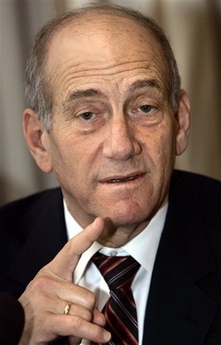JERUSALEM - Prime Minister Ehud Olmert warned that Iran would have "a price
to pay" if it doesn't back down from its nuclear ambitions, hinting broadly that
Israel might be forced to take action - his strongest words yet about the
Iranian threat.
Talking to reporters Thursday on his way home from a three-day trip to
Moscow, Olmert didn't specifically threaten to cripple Iran's nuclear program in
a military strike, as Israel did 25 years ago in Iraq when it sent combat planes
to destroy an unfinished nuclear reactor. But he repeated what he said a day
earlier after meeting with Russian President Vladimir Putin in Moscow - the
Iranians "have to be afraid" of the consequences of their intransigence.
|

Israeli Prime Minister Ehud Olmert gestures during a meeting
with the families of soldiers serving in the Israeli armed forces, Moscow,
Thursday, Oct. 19, 2006. [AP]
|
"They have to understand that if they object to every compromise, there will
be a price to pay," Olmert said.
Israel rejects Tehran's claim that its nuclear program is peaceful, designed
solely to produce energy. In the past, Israel has said it would not lead a
campaign against Iran's nuclear program, rather act in concert with world powers
that are similarly worried about Iran's intentions.
But with Iran rejecting various compromise proposals and insisting on
enriching uranium - a process key to developing nuclear weapons -
Olmert has been raising the stakes with increasingly defiant rhetoric.
Israel cannot reconcile itself to a nuclear Iran, he said - and "there
comes a time when you have to do damage control."
"A red line must be drawn that cannot be crossed," he said, without
specifying what that line was.
"Time isn't standing still," he added, "and perhaps there will be a need to
do something in the future."
Though some Israeli officials have made specific threats to hit Iran,
military experts have questioned Israel's ability to destroy Iran's nuclear
facilities, which, unlike Iraq's in 1981, are scattered among installations,
with some of them hidden underground. But they have said Israel could set the
program back years by striking several of the sites.
Israel considers Iran to be the greatest threat to its survival. Iran's
president, Mahmoud Ahmadinejad, has repeatedly called for the Jewish state's
destruction, and Iran already has missiles capable of carrying payloads to
Israel.
Russia is building Iran's first nuclear reactor and has impeded UN sanctions
against Tehran. It has also agreed to resume shipment of fuel for the reactor,
which experts say could be diverted and used to build bombs.
After meeting for four hours with Putin and Russian defense officials, Olmert
said he was convinced they understood the gravity of the situation and don't
want to see a nuclear Iran. But at a news conference with Olmert at the Kremlin
on Wednesday, Putin pointedly made no mention of the Iranian nuclear standoff.
On the plane, Olmert also reiterated his willingness to meet with the
moderate Palestinian president, Mahmoud Abbas, to try to jump-start long-stalled
peace talks. But he said he would not agree ahead of the meeting to release some
of the thousands of Palestinian prisoners Israel holds - a gesture Abbas
seeks to prove the meeting will yield concrete results for him.
Israel won't agree to release Palestinian prisoners until Hamas-linked
militants free an Israeli soldier they captured nearly four months ago, he said.
"The moment of truth with the Palestinians is closer than ever," Olmert said.
With the Palestinian Hamas-led government holding fast to its militantly
anti-Israeli stance, Olmert said, Abbas "must take brave steps, or he and we
will lose what remains of our hope."